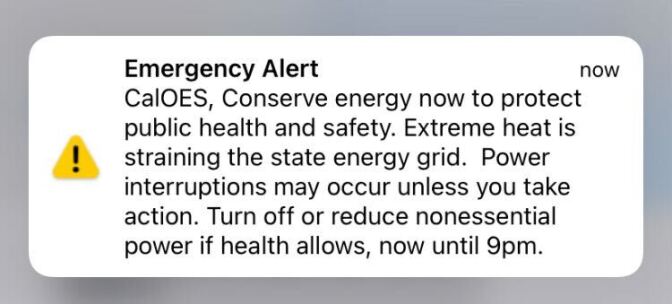Despite calls to conserve power, California's energy demands were at an all-time high Tuesday.
Get text updates
We're taking your questions about September's heat wave. Text HEATWAVE to 73224 to ask us your questions, and to receive our latest news on these outrageous temps, directly to your phone.
The extreme heat wave is creating a big need for power, so much that we blew past a record set during a heat wave 16 years ago.
Cal-ISO, which operates the state's power grid, first reported that energy use in the state surpassed more than 50,300 megawatts as of 3:09 p.m. Tuesday. That was 68 megawatts above the 2006 record. Ultimately it hit 52,061 megawatts.
The new peak in power use posed a serious concern. Shortly before 5:30 p.m. Cal-ISO elevated the flex alert to a Level 3 Energy Emergency Alert (EEA) and asked for "maximum conservation efforts."

By 8 p.m. the crisis was averted, without rolling blackouts. The department has asked everyone to cut down power use from 4 p,m. to 9 p.m. Tuesday, warning that if we didn't dial back use of power, Cal-ISO was likely to order rolling outages.
At 8 p.m., the grid operator ended its Energy Emergency Alert (EEA) with no load sheds for the night. Consumer conservation played a big part in protecting electric grid reliability. Thank you, California!
— Flex Alert (@flexalert) September 7, 2022
The state power grid's reliability has been in flux for many days as authorities have asked people to conserve energy daily since Aug. 30.
Understand Flex Alerts
Flex alerts aren’t that common, so when they’re called it’s for good reason.
Cal-ISO typically calls an alert when temperatures are hot. Energy consumption runs higher during these times, so people need to cut down. But heat isn’t the only factor. All of these issues can put a strain on our state’s power grid.
- We import power to our grid from other states, so any bad weather there can also affect us. And while the sun is our ever-present resource for solar energy, its energy is not always available. Dense monsoonal clouds can block out the sun for solar production.
- Part of the reason for the flex alert time frame (4 to 9 p.m.) is also sunshine-related. Solar production stops as the sun goes down, which could mean a supply and demand imbalance during a heatwave.
- Hot summer nights can even keep buildings warmer than usual.
Read more: Another Flex Alert Has Been Issued. Here’s Why You Should Cut Back Your Power Use
If rolling blackouts do take place, you should expect to get a notification from your utility provider. You can also check their website for a map of affected areas and a timeline for when power will be restored.
Conserve Power
How You Can Save Energy
Set your air conditioning at 78 or higher. If you can turn it off and use a fan instead, even better. You can pre-cool your house to 72 in the morning hours when there is lower demand on the power system, then when you set it to 78 in the afternoon, it won’t be quite as unbearable.
Unplug “energy vampires” -- those appliances that are sucking power from the grid even when they are not being used, like a microwave oven, and phone chargers.
Close drapes and blinds to keep your home cooler inside. Turn off unneeded lights.
Wait until the early morning or late evening hours to run the washing machine or dishwasher, or vacuum.
If you have an electric car, don't charge it in those afternoon or evening hours
For those lucky enough to have a pool, do your part by turning off your pool pump.
Stay Safe
Staying safe in the heat
- Don't wait until you're thirsty to drink water or electrolyte-replacements
- Drink cool water, not extremely cold water (which can cause cramps)
- Avoid sweetened drinks, caffeine, and alcohol
Protect a pet from excessive heat
- Never leave a pet or animal in a garage
- Never leave a pet or animal in a vehicle
- Never leave a pet or animal in the sun
- Provide shade
- Provide clean drinking water
Protect a human from excessive heat
Check in frequently with family, friends, and neighbors. Offer assistance or rides to those who are sick or have limited access to transportation. And give extra attention to people most at risk, including:
- Elderly people (65 years and older)
- Infants
- Young children
- People with chronic medical conditions
- People with mental illness
- People taking certain medications (i.e.: "If your doctor generally limits the amount of fluid you drink or has you on water pills, ask how much you should drink while the weather is hot," says the CDC)









